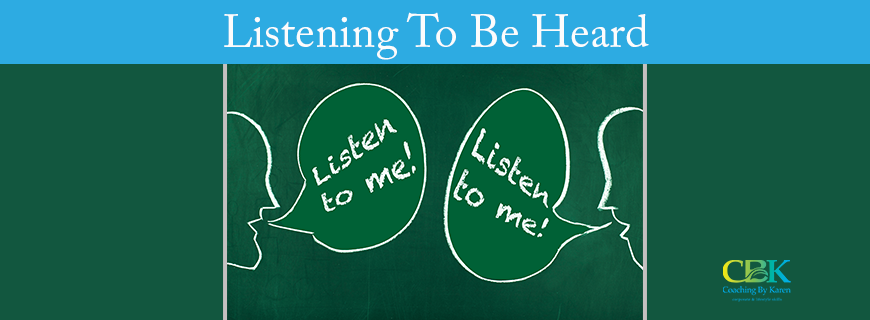Listening To Be Heard: The Lost Art

By: Michael Steele, Corporate Coach
We all want to be heard as we express our views in both private and public conversation. Yet, we have lost our sense of how important listening is to great conversation, both in public discourse and in business. In this fast paced, multi-tasking, high tech world with less and less personal communication, it is time to stand back, draw a deep breath, and start listening to the people next to us and in the world around us. As we listen, we will be heard.
There are skills to listening that are overlooked and taken for granted. These skills are much more than the standard eye contact, body language, show that you’re listening, nod your head stuff. Real listening involves taking the time to time to be engaged, be present, and try to understand what the other person is saying.
“My wife complains that I never listen to her ……. or something like that.” This is an old joke that too often rings true. If we pay attention to what our partners say, and ignore the outside noise, our conversations and our relationships will become that much deeper. Too often, we only listen so we can talk next. To quote Steven Covey;” Most of us don’t listen with the intent to understand, we listen with the intent to reply”.
Why does listening seem to be so hard for us to do?
Talking gives us control and makes us the center of attention. Our ego’s desire for power and control, and to have our point of view be heard, makes talking seem important. Listening is hard and takes energy. You can speak at 225 words a minute and listen at a rate of 500 words per minute. As a result, it takes more energy and concentration to stay focused on the conversation as a listener. But which part of the communication process has more power? A good listener can create their own power as they gather all the information and hear the true message and intent.
So, what is good listening? A good listener focuses, is present in the conversation and does not multi task. In face-to-face conversations, this focus is for the courtesy as well as the information. There are challenges in a face-to-face meetings such as other conversations around you, and people walking by that distract your eye contact. It takes concentration and discipline or you can lose focus.
In remote conversations via, phone or computer, the temptation to multitask is huge. Staying focused at your desk, on the phone, can be a challenge. It can be very noticeable when you are looking at your messages or writing an email when you should be listening, but then missed the conversation and need to engage or reply. Think about the last time you were on a call? Did you have their full attention?
When it comes to listening to someone speak in a conversation, it is important to assume good intent. This is especially important when in conversation with people with whom we disagree. Listen to the full message and ask questions on how they came to their position. Be open to learn and question. Then, you are able to expect the same in return. If we ask questions of others it signals to them that they are being heard.
Stay calm as you listen, even if you are hearing something of which you disagree. Listen to the person sharing, and hear all the information, not to reply, but to listen. As you ask the question, ask with the intention to learn. This is not the time to show you’re “the smartest person” in the room. There will always be time if warranted to share a different point of view.
When we are listening to someone, often times a great thought, question or story might come rushing into our minds. Our instinct is to interrupt, bring up the point, or hold on to the idea and wait until they are done speaking. Instead, let it go. If you try to keep this thought, you have stopped listening. If you interrupt, you have obviously stopped listening. Not all good ideas need to come out the minute you think of them. Let it go and listen. If it’s important, you will be able to remember and share.
My plan to develop my skills as a listener:
- Listen intently on what is being shared with childlike curiosity.
- Develop the desire to hear and understand what the other person is saying.
- Be willing to ask questions while assuming good intent
- Stay calm and self-aware before I decide to share a point of view.
If we can work at some of these basic listening skills we could start a lot of great conversations in this country. Let’s just start listening for them.
“When you talk, you are only repeating what you already know. But if you listen, you
may be learning something new”. Dalai Lama
Michael Steele has used his basketball coaching experience to create winning teams in business and finance. He offers a unique perspective to business leaders and team members looking for the “win.” Click here for more info on Michael.

